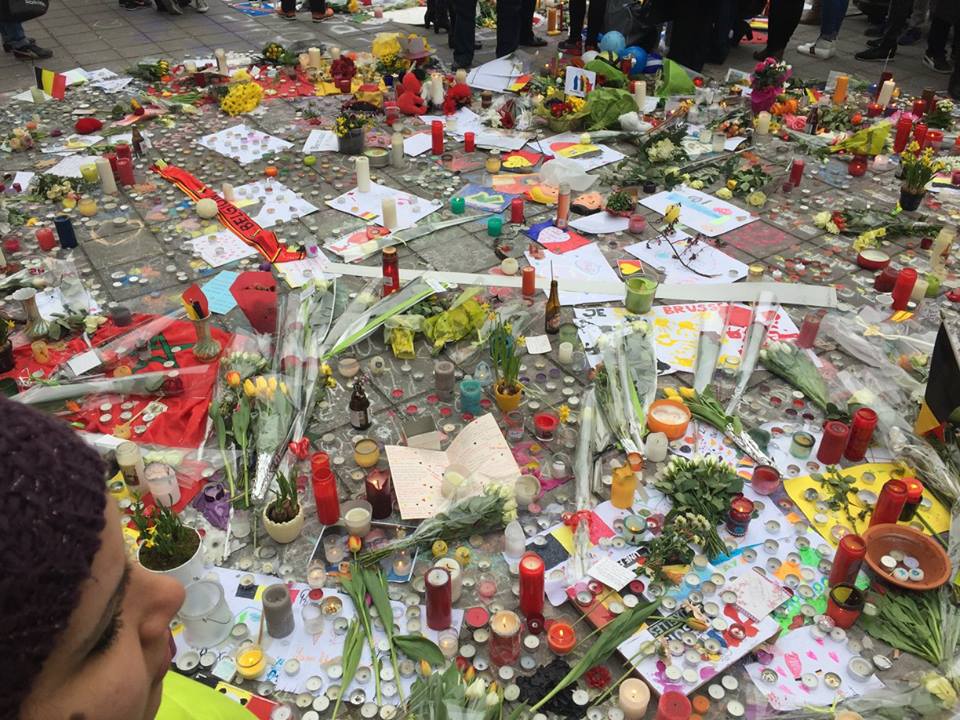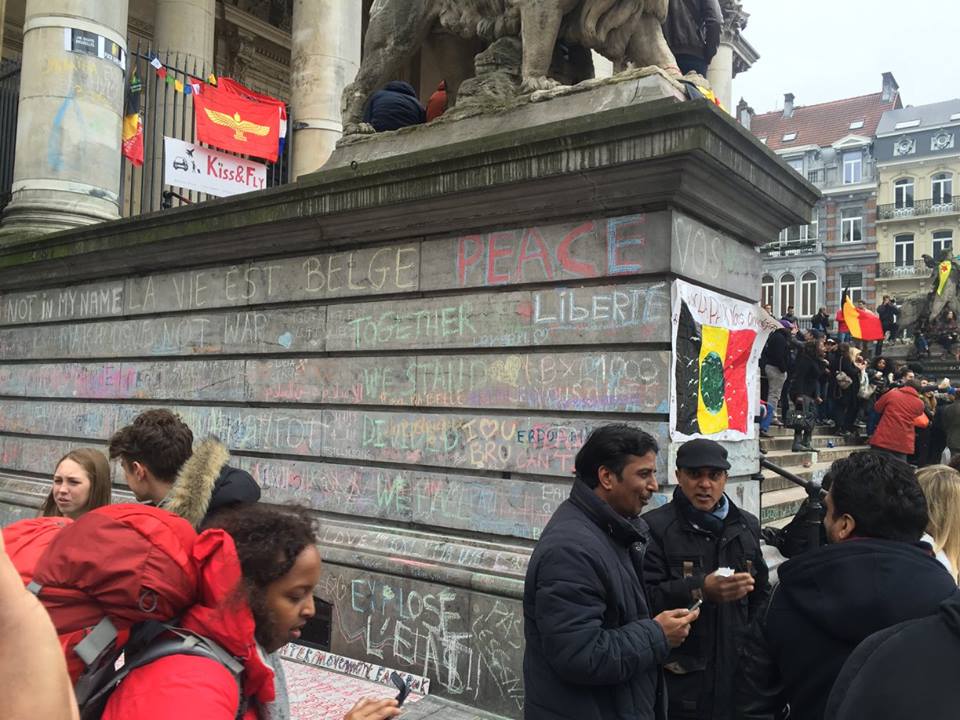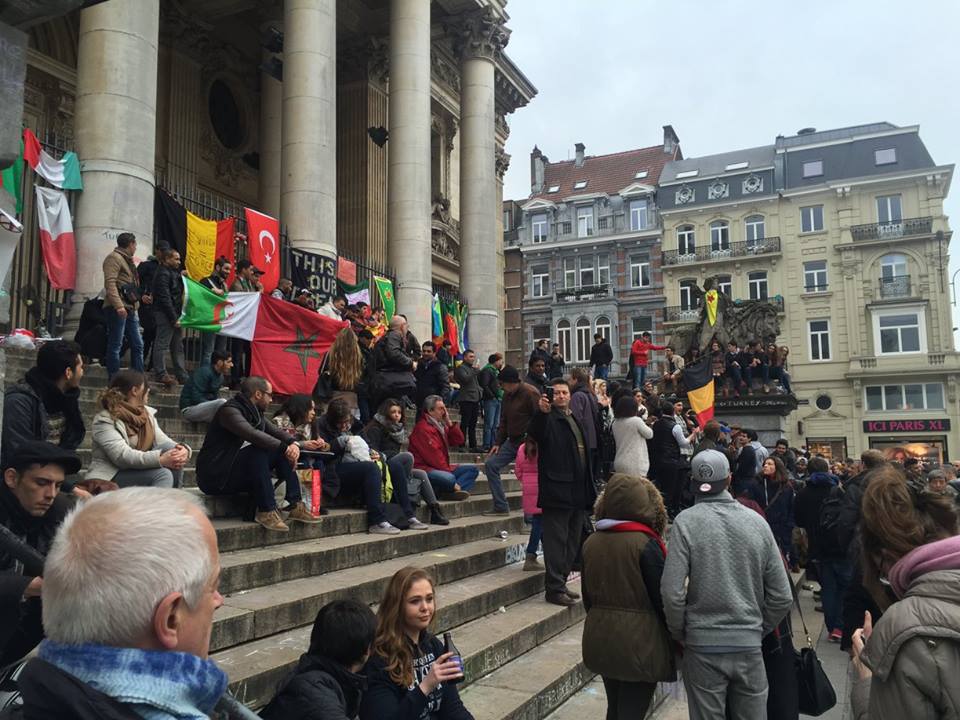How SPS students relied on respect, flexibility in the wake of tragedy
 Photo courtesy of Kelly Williams.
Photo courtesy of Kelly Williams.
Danielle Davis said she
and other School of Public Service students were having breakfast and about to
enter the train station in Leuven, Belgium, when she heard there had been an
explosion at the airport.
“We made our way to the
train station in Leuven,” Davis said, “and when we arrived, we had just missed
our train into Brussels.”
Such a close encounter
registered only with a few students after they heard about the explosions just 20 minutes away in Belgium’s capital. Professor Joe Schwieterman said the students heard about the initial explosion at breakfast and about the second explosion as they were entering the train station in Leuven.
Davis, who is pursuing a
degree in International Public Service, and 16 other SPS students were on a
study abroad trip to Brussels with Schwieterman last week when
terrorist assaults at the Brussels Airport and a train station killed more than
30 people and injured more than 300.
The students were in Belgium as part of a study abroad
course, MPS 575, “Understanding
the Global Public Sector: Impact and Influence of the European Union and NATO.”
The class is
designed to “explore how globalization is affecting
national governments and traditional cultures while encouraging the creation of
international non-profits and supra-national governing agencies.” But the
students had no idea just how tangible the lessons would become.
“I think I'm still
processing it,” Davis said this week of the attacks. “I haven't really had time
to sit and reflect on all of it. It still seems very surreal.”
 Photo courtesy of Kelly Williams.
Photo courtesy of Kelly Williams.
Davis said the group spent
the previous afternoon at the European Parliament in Brussels and was headed to
the European Commission on the day of the attacks.
She said students managed
to carry on with their program for the remainder of the week. The trip included high-level visits with European policymakers and a day trip to a NATO air base.
“Professor Joe Schwieterman
did not let this deter us from learning this day,” Davis said. “Although it was
a sad day, we all spent the day together and were able to support one another.”
Professor Schwieterman said he was "so proud of our students for being flexible
and highly respectful of those facing hardship due to these
awful acts. We had a lot of tense moments, but banded together to
make the best of a difficult situation."
Davis said DePaul
University’s study abroad office immediately contacted Schwieterman and
arranged travel back to Chicago once the Belgian government shut down the
airport. She said the office also contacted students’ parents and kept them
updated on their safety.
The group also received a
security escort to the airport. “The study abroad office
handled everything flawlessly,” Davis said. “They truly helped us all keep our
stress levels down and be able to enjoy the remainder of our trip.”
 Photo courtesy of Kelly Williams.
Photo courtesy of Kelly Williams.Such has become the
standard for study abroad at U.S. universities including DePaul. With political
instability and conflict affecting many regions of the world, university study
abroad offices have prioritized student safety.
NAFSA,
the organization of international educators, has conducted conferences that
carry similar emphasis, particularly after the Arab Spring.
“My parents were pleased
with the emails they received later that morning from the abroad office, and
that the emails were full of information on every aspect on what was happening,”
said Kelly Williams, another IPS student on the trip.
Regarding
the political climate in Belgium, Williams said, “I talked with some local
citizens, and they are upset because they just see themselves as a neutral
country, and don't fully understand why they are being attacked.”
He added:
“Other people saw it as an inevitable event, blaming the oversights on the
Muslim neighborhoods and lack of security, and there was a bit of racial
tension in those comments. Some other people blame the fact that there is a
lack of assimilation and that those who migrate to these Muslim neighborhoods,
like Molenbeek, are never welcomed into the rest of Brussels. And there is a
lot of mistrust between the citizens and the police, which creates more fear
and anger.”
Schwieterman said the events in Brussels "both saddened us and made us all realize how difficult it
will be to maintain free movement of people throughout Europe.
The timing of these terrorist acts is especially inopportune for
those seeking more humane policies for Syrian refugees"
 Photo courtesy of Kelly Williams.
Photo courtesy of Kelly Williams.Two
days after the attacks, Williams said the group visited the memorial site in Brussels and saw more than a thousand people there.
He
said he saw unity in the mourning of the victims. He saw people singing,
chanting and hugging. “It
was a positive environment,” he said.
Williams
noted that riots involving left-wing and right-wing demonstrators that have since
taken place there.
“Brussels
is a very interesting city,” he said. “It is pretty divided between French and
Flemish communities, and there is overall a serious lack of communication, it
seems. That's why some people were not surprised about these attacks at all.
Belgium and Brussels have some serious internal issues they need to mend in
order to boost security and unity within the country.”
Williams said he considered it "fascinating and disheartening how nationalism and language" can still divide people, even
within a single country.